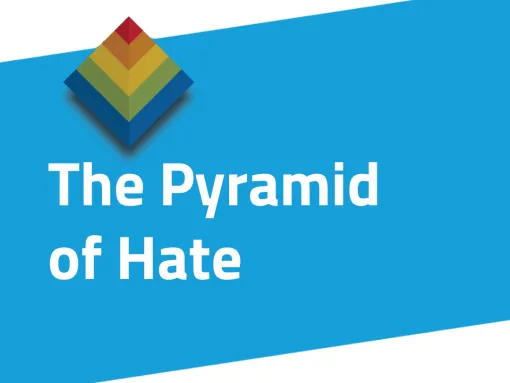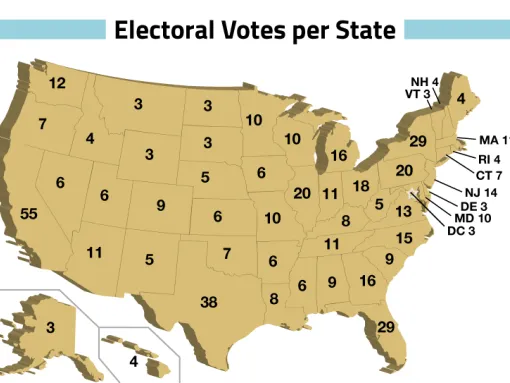Many people are unsure what to say or do when confronted with offensive humor or slurs. When bystanders choose to stand silently by, however, they may be inadvertently communicating their acceptance of the behavior to others. The following process outlines a way to respond that has proved helpful for many people, from elementary school children to adults.
1. Clarify for yourself what you want to get out of the interaction.
If your primary goal is to express your anger and indignation…
178 Results
Student Learning For Students | 6 and up

Use ADL's high school civics curriculum to help students explore their civic engagement and examine complex topics through an anti-bias lens.

Mini-Lesson For Students
About the Mini-Lesson
This mini-lesson will introduce you to the Pyramid of Hate, an ADL concept and activity that demonstrates how the seeds of bias, once planted, can grow quickly from biased ideas to discrimination and acts of violence.
ADL's mini-lessons for students are short, interactive, online lessons for you to learn about a core ADL topic, theme or activity.
Objectives
This self-paced mini-lesson will enable you to:
Explore…

April is National Poetry Month
National Poetry Month provides an opportunity for many schools and classrooms to dedicate time to the study of reading and writing poetry.
Poetry uses vivid and descriptive language, beautiful imagery, unique sounds and rhythms, and diverse voices. It often evokes an emotional and empathetic response and can open doors to people and worlds for which we are unfamiliar. It can touch hearts and minds and motivate action and societal…

What Educators and Family Members Can DoToday, local, national or international tragedies happen so frequently that they can feel almost commonplace. When a hate crime, mass shooting, act of terrorism or other terrible and hate-inspired event occurs, one of the first questions many people ask is, what should we tell the children? How can we explain to them what has happened? Despite our best efforts to protect youth from the details of hate-motivated events, we can never assume that they are…

The topic of antisemitism is complex, deeply historical and has a myriad of elements to it. Antisemitism is not only about defaming and attacking the Jewish community; it is a symptom of a larger issue. While antisemitism has sometimes escalated to violence as we saw at the Tree of Life Synagogue shooting, it more often appears in subtler ways, such as insensitive remarks or “jokes” that are brushed off, or negative stereotypes that go unchallenged.
Today, Jewish young people…

In recent years, there has been an increase in anti-Asian rhetoric including bullying in schools, racist incidents, scapegoating and hate crimes impacting Asian and Asian American people. This is an important opportunity to have conversations with young people about the history of violence and injustice against the AAPI community. In addition, this time also provides an opening to engage students in learning more about the history and background of AAPI people and how to act as an ally when…

Table Talk: Family Conversations about Current EventsWhat is the difference between having the right to vote and having the ability to vote?
The Voting Rights Act of 1965 was passed more than 50 years ago, securing the right to vote for all. Although there have been struggles with voting over the years, the Voting Rights Act secured the right to vote for Americans. But in reality, there is a difference being having the right to vote and being able to vote in the U.S. Voter suppression…

Is your school experiencing a bias or hate incident?
Whether it be a racist “joke,” slur, stereotype or some other form of implicit or explicit bias, school community members must be committed to addressing bias-related incidents in schools.
Educators and school administrators play vital roles in creating an environment where all students can learn and thrive. Cultivating an equitable and inclusive school community requires ensuring that historically marginalized students…

National Hispanic Heritage Month honors the achievements, contributions, culture, and history of Hispanic and Latin American people. The month-long celebration begins on September 15 commemorating the anniversary of independence for five Latin American countries: Costa Rica, El Salvador, Guatemala, Honduras, and Nicaragua. In addition, Mexico and Chile celebrate their independence days on September 16 and September 18, respectively. The 2024 theme for National Hispanic Heritage Month…

Table Talk: Family Conversations about Current EventsOn Wednesday, January 6, 2021, Congress met in the U.S. Capitol to count electoral votes and certify the results of the 2020 Presidential election. This is a formality that takes place every four years under our country’s system for choosing its President and Vice President. While this took place, a violent mob of right-wing extremists and others, who came to Washington, D.C. (and several state capitals) to disrupt and overturn the…

Table Talk: Family Conversations about Current EventsThe Electoral College is an election topic that inspires confusion, controversy and conflict. Many people know that the Electoral College is part of the Presidential election process but may be unsure about its importance and how it works.
In the early days of our country’s formation, deciding on the process for electing a U.S. President was a controversial topic. Some suggested that Congress should choose the President…

September 17, 2020 Talking with young children about voting and elections can open doors to conversations about fairness, democracy, citizenship and participation. As children grow, it is critical to help them understand how government works, the importance of civic participation and how voting is a key way to make your voice and your opinions heard. These picture books, some fiction and some non-fiction, provide discussion starters about voting, equity, gender, race,…

Sports and athletes are captivating to young people and adults alike. We look up to athletes as our heroes, idols and role models. And yet, sometimes sports provide a negative example: a way not to act or behave.
Throughout our nation’s history, athletes have taken stands on issues and made political statements, lent their names to causes they believe in and used their power and platform to speak truth to…

Table Talk: Family Conversations about Current Events For Educators | For Parents, Families, and Caregivers | 10 and upIn its simplest terms, voting is an act of expressing your opinion. Whether you participate in a poll, take an online survey or vote in the Presidential election, you are expressing an opinion or point of view with your vote. Merriam Webster defines voting as “to express one's views in response to a poll” or “to express an opinion.” In political…

Table Talk: Family Conversations about Current EventsIn the wake of George's Floyd's murder in May 2020 by the police, protests erupted across the United States. The first protest took place in Minneapolis, MN the night after George Floyd was killed. Within days, protests were taking place in all fifty states and more than 140 cities nationwide. Tens of thousands of people also gathered in countries around the world to support the protests and show solidarity. In a…

Table Talk: Family Conversations about Current Events(Updated April 2021)
On May 25, 2020, George Floyd, an African American man, was killed while being arrested by the police. A bystander video recording of the incident showed that a white police officer pinned Floyd to the ground while he was handcuffed. The police officer’s knee pressed into the back of Floyd’s neck for more…

Table Talk: Family Conversations About Current Events Despite advances, LGBTQ+ people continue to face bias, discrimination and injustice in our classrooms, workplaces, media, streets and digital spaces. While great strides have been made in recent years, including marriage equality, there is still much work to do to achieve equity for members of the LGBTQ+ community.
What is heterosexism?
Heterosexism (sometimes referred to as homophobia), is defined as: “the…
All Americans have a stake in effective response to violent bigotry. Hate crimes merit a priority response because of their special impact on the victim and the victim's community. Failure to address this unique type of crime could cause an isolated incident to explode into widespread community tension. The damage done by hate crimes cannot be measured solely in terms of physical injury or dollars and cents. These crimes may effectively intimidate other members of the victim's community,…









